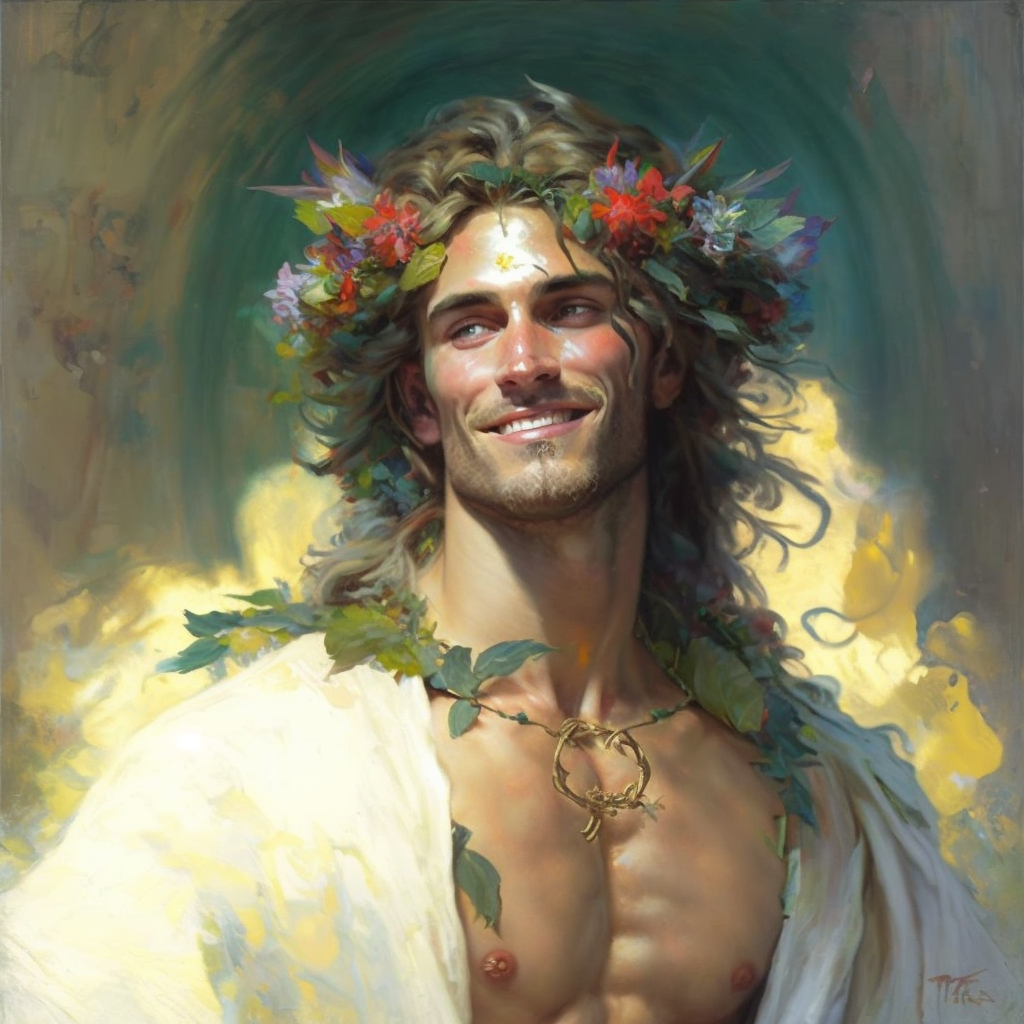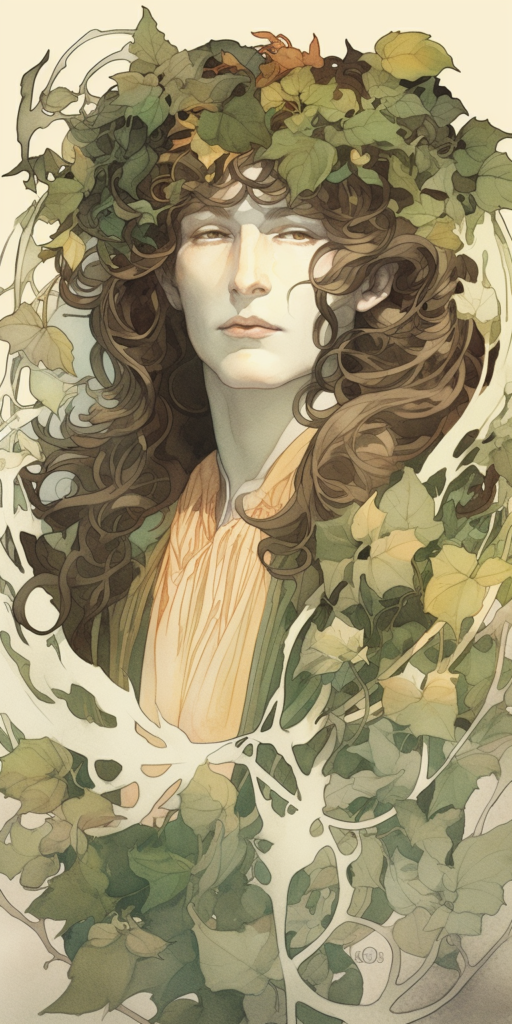Iacchus (God of vegetation and fertility)
Iacchus a minor deity in Greek mythology, associated with the Eleusinian Mysteries and often identified as a son of Demeter and Dionysus.

- Pantheon: Greek Pantheon
- Deity Title: Iacchus
- Deity Symbol: Torch, Ivy, and other Vegetation
- Home Plane: Olympus
- Deity Level: Lesser deity
- Alignment: Neutral
- Aliases: Iakchos, Bacchus, Eleusinian Mysteries
- Superior: Demeter, Dionysus
- Traditional Allies: Demeter, Dionysus, Hecate, Persephone
- Traditional Foes: Those who disrespect nature and the cyclical order of life and death
- Divine Artifact: None
- Servants: The Iacchaei (initiates of the Eleusinian Mysteries)
- Servitor Creatures: Satyrs, Nymphs, and other nature spirits
- Sacred Animal: None
- Manifestations: Youthful figure with flowing hair, often adorned with wreaths of ivy or other vegetation; accompanied by torches and other sacred objects
- Signs of Favor: Fertile harvests, bountiful crops, and vibrant natural surroundings
- Worshipers: Farmers, nature enthusiasts, initiates of the Eleusinian Mysteries
- Cleric Alignments: Neutral
- Specialty Priests: None
- Holy Days: The Greater Mysteries (held every five years) and the Lesser Mysteries (held annually)
- Portfolio: Vegetation, Fertility, Renewal, Cycles of Life and Death, Ritual, Transformation
- Domains: Life, Nature, Renewal, Ritual
- Favored Weapon: None
- Favored Class: Druid
- Favored Race: Half-Elf
- Duties of the Priesthood: Preside over the Eleusinian Mysteries, promote ecological consciousness, protect the natural world, foster spiritual growth and renewal
- Major Cult/Temple Sites: The sanctuary at Eleusis, Greece
- Benefits: Access to spells and abilities related to the domains of Life, Nature, Renewal, and Ritual; connection to the power and transformative potential of the Mysteries; protection and guidance from Iacchus and other allied deities.
Iacchus is a minor deity in Greek mythology, closely associated with the Eleusinian Mysteries and worshiped as the son of Demeter and Dionysus. As a deity of vegetation and fertility, Iacchus represents the cyclical nature of life and the joy of the harvest season.
As a character, Iacchus is often depicted as a youthful and exuberant figure, leading processions of revelers and initiates through the streets of ancient Athens. His followers, known as the Iacchaei, wore masks and carried torches in honor of their deity, who was believed to be a bringer of blessings and divine revelation.
Iacchus’ primary motivation is to inspire and uplift his followers, helping them to connect with the spiritual and natural worlds through the transformative power of the Mysteries. Through his rituals and teachings, Iacchus seeks to help mortals achieve a deeper understanding of the cycles of life and death, and the interconnectedness of all things.
At the heart of Iacchus’ mission is the desire to bring about a sense of harmony and unity between humanity and the natural world. As a deity of fertility and vegetation, he understands the importance of respecting and honoring the earth’s cycles, and seeks to guide his followers towards a deeper appreciation of the natural world and its rhythms.
Iacchus is often depicted as a youthful and vibrant figure with flowing hair, often adorned with wreaths of ivy or other vegetation. He is typically depicted wearing a robe or tunic, and carrying a torch or other sacred object. His face is often painted with a joyful expression, reflecting his role as a bringer of blessings and revelry.
In essence, Iacchus represents the transformative power of ritual and the potential for spiritual growth and renewal. Through his teachings, he offers his followers a path towards greater wisdom, enlightenment, and connection to the divine.
Currently in the World

As the 1450s roll around, Iacchus, the minor Greek deity of vegetation and fertility, continues to inspire and uplift his followers through the transformative power of ritual and initiation. Though his worship has waned in popularity in the centuries since his heyday, Iacchus remains a potent force in the lives of those who seek a deeper connection to the natural world.
At this time, Iacchus is focused on the spread of the Renaissance, a cultural and intellectual movement that has swept across Europe and is transforming art, science, and philosophy. He sees the Renaissance as a time of great possibility and potential, and seeks to inspire artists, thinkers, and visionaries to embrace the beauty and complexity of the natural world.
In particular, Iacchus is drawn to the work of artists like Botticelli, who depict the mythological figures of the Greek pantheon with a renewed sense of beauty and vitality. He sees in these works a reflection of his own spirit, and hopes to use them as a means of inspiring others to embrace their own creativity and inner potential.
As Europe enters a period of rapid technological advancement and exploration, Iacchus is also keenly aware of the potential dangers of this new era. He is concerned that humanity’s drive to conquer and control the natural world could lead to ecological disaster and the loss of the delicate balance of life.
To counteract this trend, Iacchus seeks to inspire a new generation of environmentalists, who see the natural world not as a resource to be exploited, but as a sacred and fragile ecosystem that requires careful stewardship. He hopes that through his teachings and rituals, he can guide humanity towards a deeper understanding of the interconnectedness of all things, and inspire a new era of ecological consciousness and stewardship.
In the 1450s, Iacchus remains a potent force for transformation and renewal, inspiring his followers to embrace the beauty and complexity of the natural world, and to work towards a more harmonious and sustainable relationship with the earth.

 Buy me a coffee
Buy me a coffee